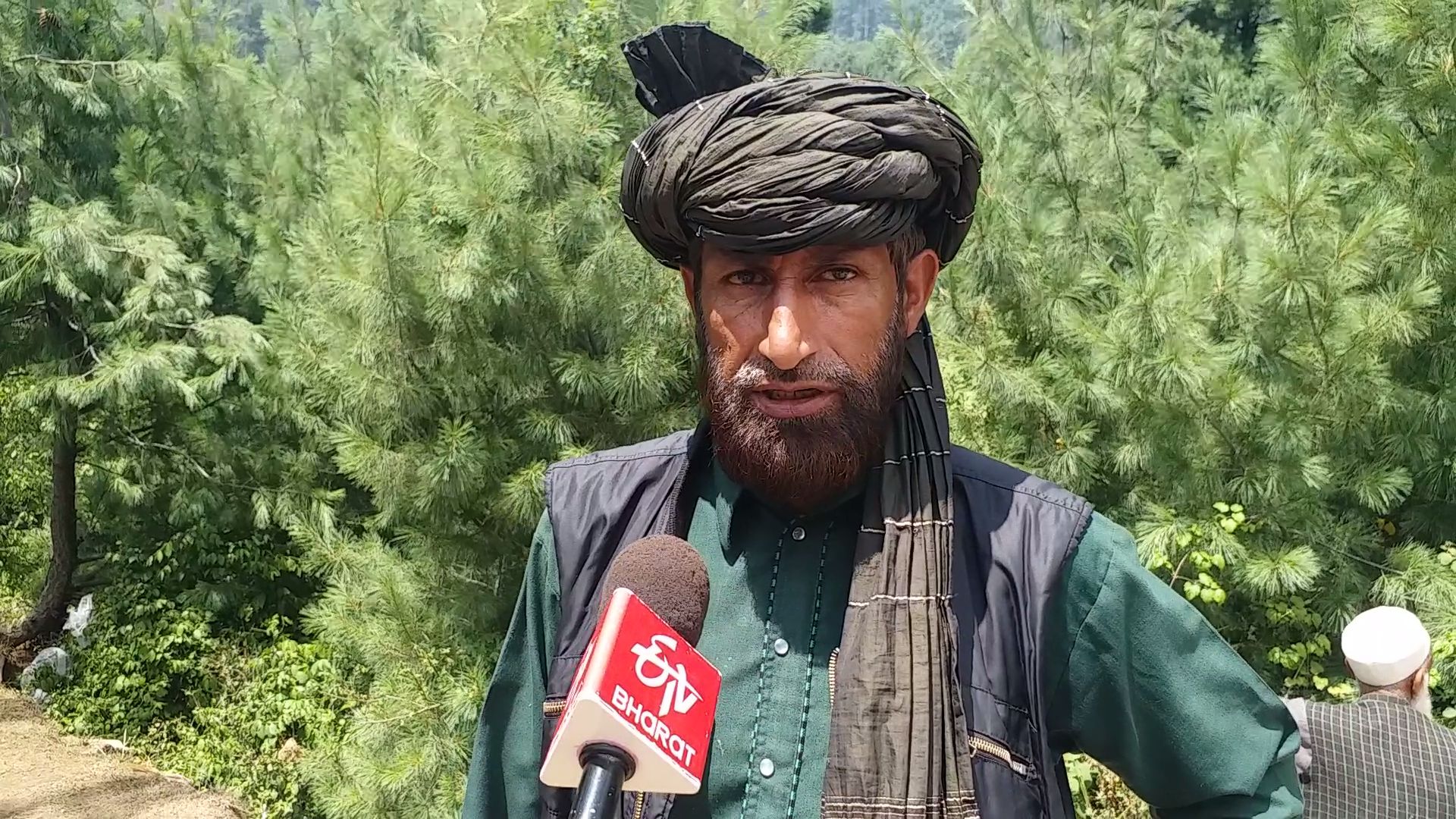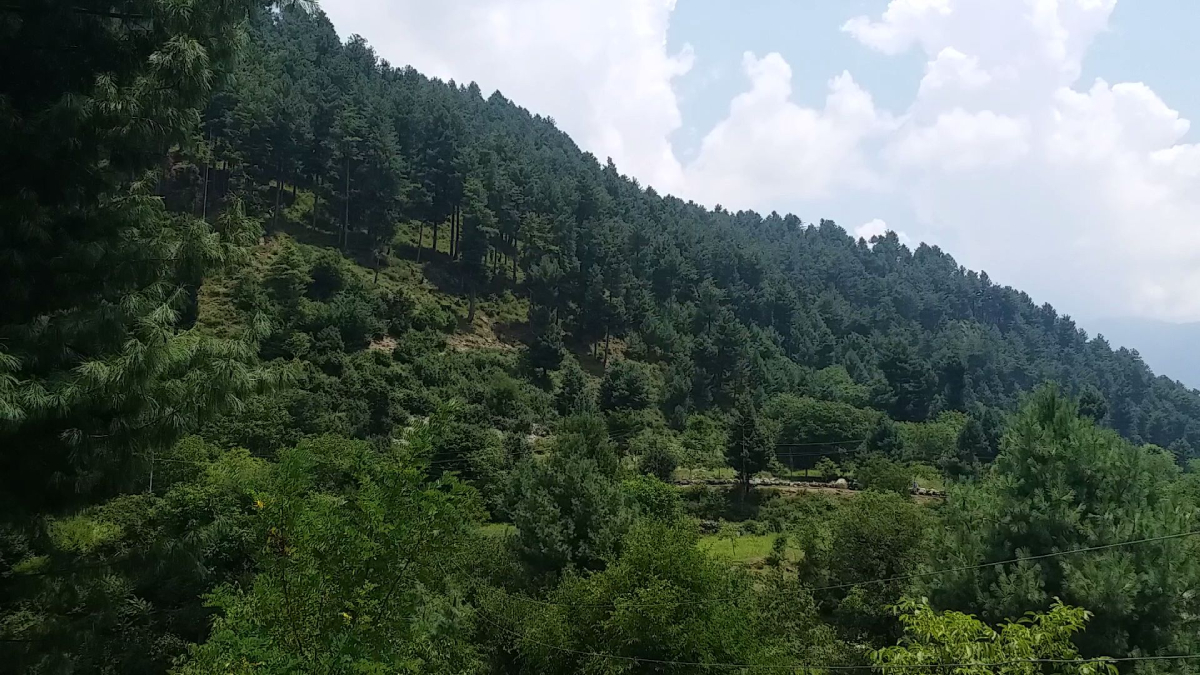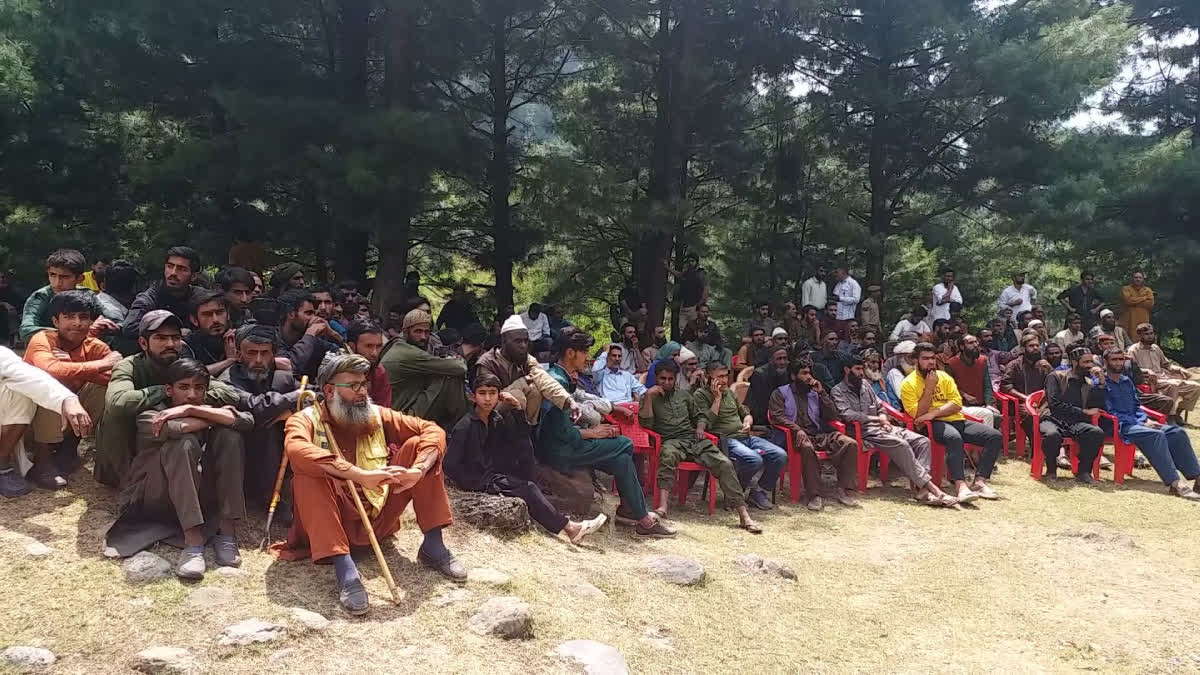Srinagar: The implementation of the Forest Rights Act (FRA), which recognises tribal rights over forests, was the only act that was celebrated by the tribal population of Jammu and Kashmir after the abrogation of Article 370 and 35 A. Enacted in 2006 by the Congress-led government in Centre, the Act was implemented in Jammu and Kashmir 14 years later in 2020, a year after the abrogation of Article 370 and division of the erstwhile state into two union territories.
The FRA brought cheers among tribals like Abdul Rashid Jagad, a 50-year-old Gujjar from Hanjan, a small village of the Tral forest belt inhabited by 300 Gujjar families in the Pulwama district. "Forest employees do not allow us to graze our cattle and collect firewood or forest produce," Jagad told ETV Bharat.

"Fencing of forests has hampered grazing and our movement," he said, adding that FRA will ease these restrictions. The act grants rights for dwelling, collection of forest produce, demarcating routes of grazing, construction and of community dhoks (temporary huts) for seasonal migration of tribals and dwellers after they apply through a procedure laid down in the Act.
The FRA grants two kinds of ownerships-community and individual-to-tribals and forest dwellers and its implementation is done at the grassroots level. As per the Act, Gram Sabhas pass a resolution to declare a land as forest and then the claims are filed by written applications. The Sabha is presided over by the chairman and is attended by members of the community, Forester, Patwari and panchayat secretary.
"Gram Sabha chairpersons have to sign the resolution but they do not sign as they are in nexus with the administration," Mustafa Rahi, District Development Councilmember from Kalaroos in Kupwara district, told ETV Bharat. "When they do not sign, it means the gram sabha was not held," he added. The claims are then viewed by the block, sub-divisional and district-level committees to check the applications for correction.
But the ownership is not so easy to come as was anticipated by tribals like Jagad, who says it takes months for a claim to settle before it is accepted or rejected by the government. The disbelief among tribals stems from the allegations that the Jammu and Kashmir administration has been "wilfully neglecting" claims of the tribals or forest dwellers.

Zahid Parwaz Choudhary, a young Gujjar activist, said the FRA is the "best act" in the Constitution of India but it is "disrespected" by the Jammu and Kashmir government. Choudhary, who is mobilising and educating Gujjars for the FRA, said the Act grants rights to not only the tribals but also the non-tribals like Dogras in Jammu and Kashmir in Tosamaidan area of Budgam district or Kangan area in Ganderbal district.
Choudhary said that they held GramSabhas in 30 villages. From Tral in Pulwama district, Shopian, Kupwara to Kangan in Ganderbal district where they passed resolutions, filed claims, but these claims did not move beyond BDO offices. "As many as 3,000 claims have been filed by the Gujjar community across Kashmir but none has been accepted yet by the forest department," he said.
However, the government data reveals that genuine claims have been settled and land titles have been issued as per individuals and community rights. Dr Sheikh Ghulam Rasool, activist and consultant for tribals on FRA, accused the forest department and its employees of being "the main and major hurdle" in its implementation. "The forest officials mislead and misinform people about the act," he told ETV Bharat.
Fayaz Karnahi, another tribal activist, said the tribals need a lot of consultation, workshops, and hand-holding about the Act. Communist legislator Yousuf Tarigami told ETV Bharat that FRA implementation is one of the biggest issues at the national as well as the Jammu and Kashmir level. "FRA implementation needs a sustained movement across the country and in Jammu and Kashmir for its benefit to reach the tribals and forest dwellers," Tarigami said.
As per the official data of the Forest Department in Jammu and Kashmir, a total of 315 Individual Forest Right (IFR) and 433 Community Forest Right (CFR) titles have been issued in 10 districts of the Kashmir valley. These titles involve a total forest land of 78.4035 hectares for IFR claims and 197.77 hectares for CFR claims.
These titles have been issued against 17,135 claims for IFR which were received by the Forest Rights Committee (FRC) at the Gram Sabha Level. Of these claims, 807 were accepted while a majority of 16,265 were rejected; while the rest of 492 were rejected at the Sub-Divisional and District Level Committees and 63 are pending as yet.
For the CFR cases, a total of 1,387 claims were received. Out of that number, as many as 483 were accepted and 837 were rejected at the Gram Sabha Level and 70 are pending for redressal. At the Sub-divisional and District Level committees, 45 claims were rejected while three were sent back to Gram Sabhas.
The district-wise data suggests that in Anantnag 52 hectares of forest land was allotted under IFR and 3.50 hectares under CFR. For Pulwama, 5.10 hectares were settled for IFRand 1.92 hectares for CFR. In Kulgam, 31.17 hectares were settled for CFR and nothing for IFR.
In the Shopian district, 11.26 hectares of forest land were settled under IFR and 0.20 hectares under CFR. For Bandipora, 127 hectares were settled for CFR, and no title has been issued under IFR. In the Ganderbal district, 0.6950 hectares were settled for IFR, and 0.32 hectares were issued under CFR.
In Srinagar, no title has been issued under IFR or either CFR. For Baramulla, 1.89 hectares were issued under CFR and nothing under IFR. In Kupwara district, 5 hectares were issued under IFR and 29.3 hectares under CFR.
In the Jammu region, the claims filed for IFR are 12,173 by Schedule Tribe (ST) claimants and 3,925 by Other Than Forest Dwellers (OTFD) claimants. 7921 were filed for CFR by ST claimants and 3,545 under the OTFD category. However, 12,122 claims under IFR for ST and 3914 OTFD claims were rejected, and for CFR,4072 ST and 2,236 OTFD claims were rejected.
Of the accepted claims, 38 titles were distributed for IFR, none under OTFD, while 3970 titles were distributed under CFR for ST and 1180 for OTFD. For these accepted claims, 3.83 hectares of forest land were settled under IFR for ST claims and none for OTFD claims. For CFR, 2481.3175 hectares were distributed for ST and 553.3474 for OTFD.
Kirti Vardhan Singh, Minister of State (MoS), Environment, Forest and Climate Change, said Jammu and Kashmir is marking a major step in empowering forest dwellers and tribal communities under the FRA. Singh, who was replying to a question by Member of Parliament Gulam Ali Khatana in Rajya Sabha recently, said a total of 6,020 forest right titles were distributed. The minister said 429 individual rights and 5,591 community rights have been recognised.
Jagad, however, said their community claim is pending at the BDO office for the last five months, debunking the claim of "tribal empowerment" by the government.



